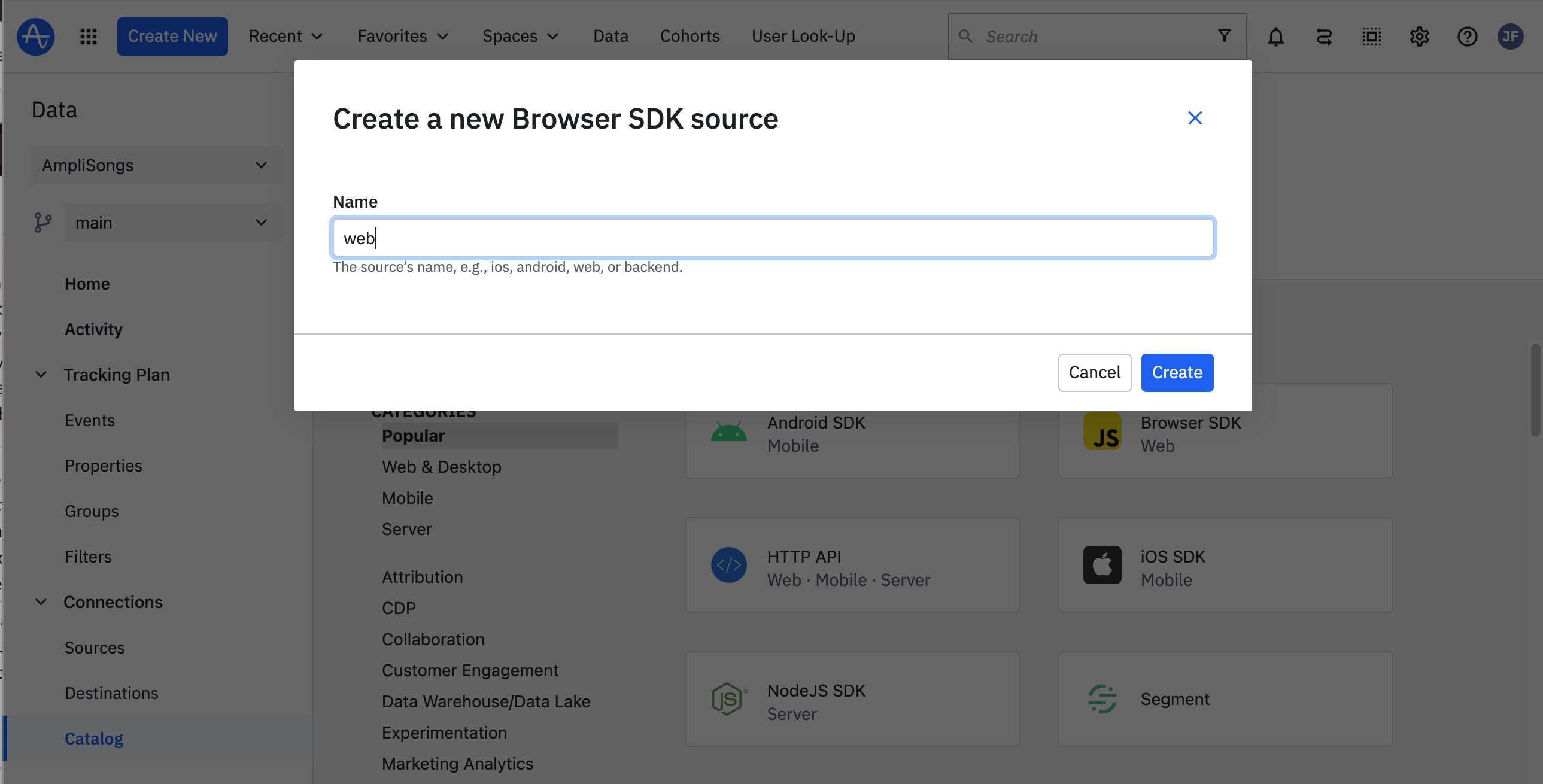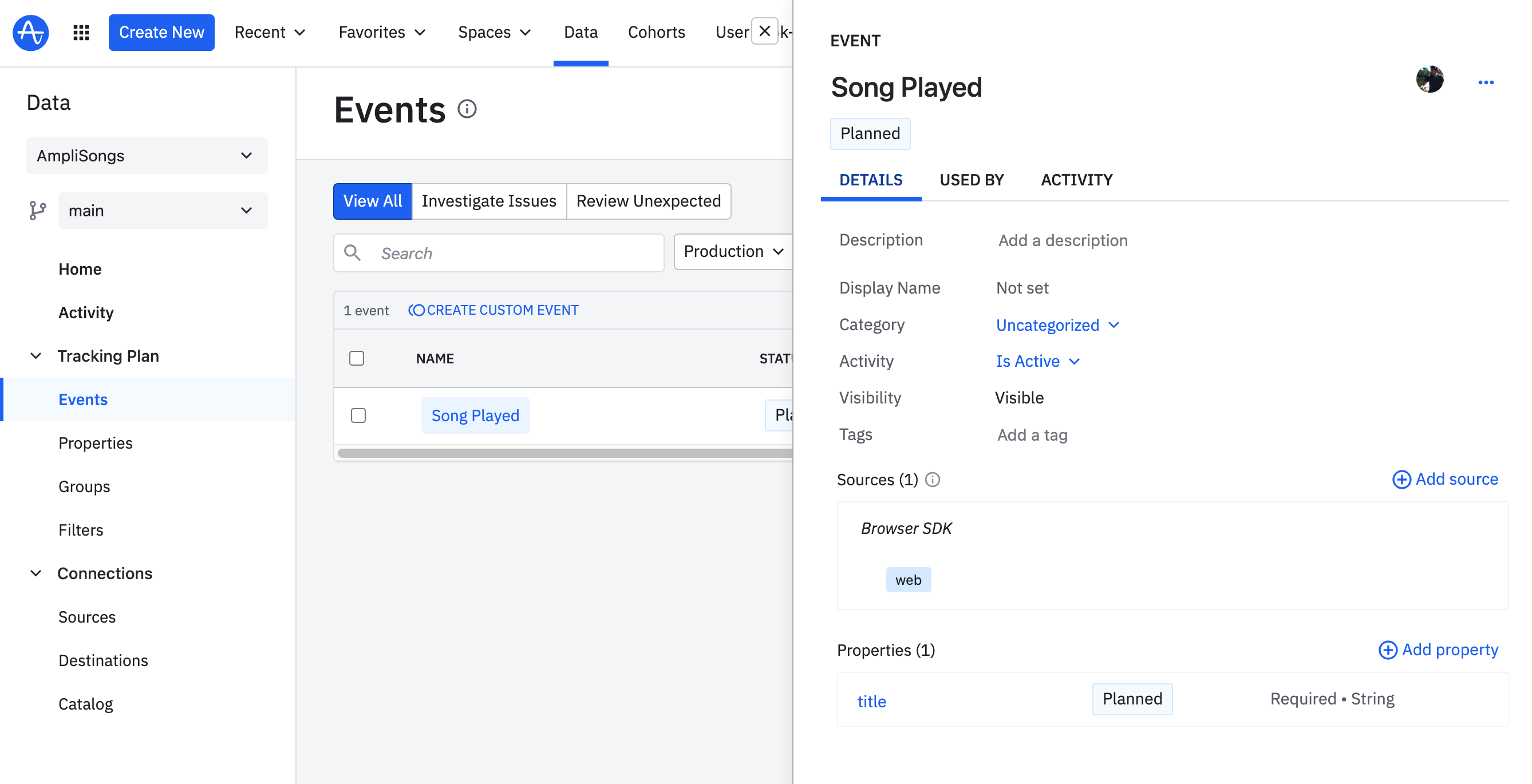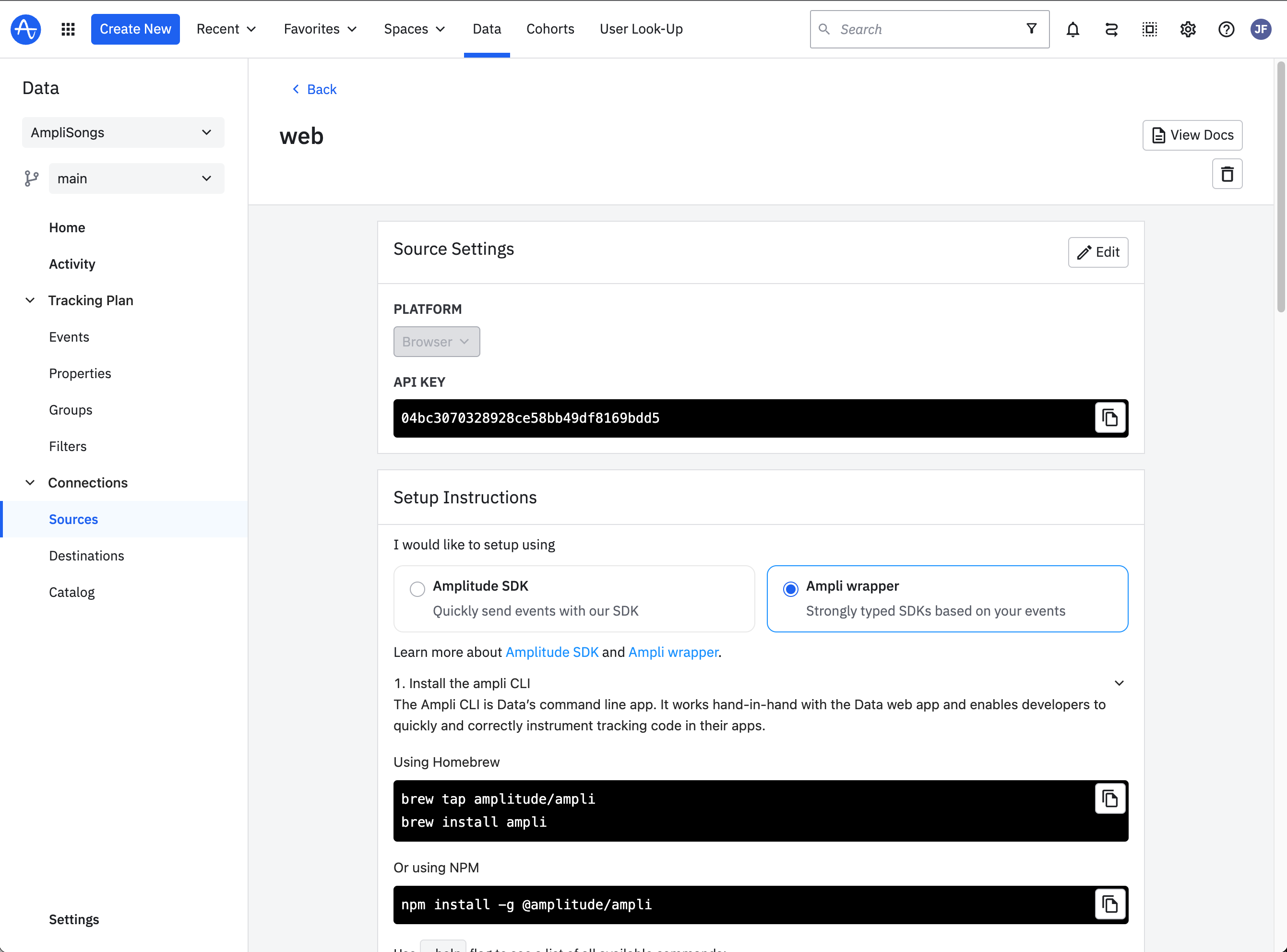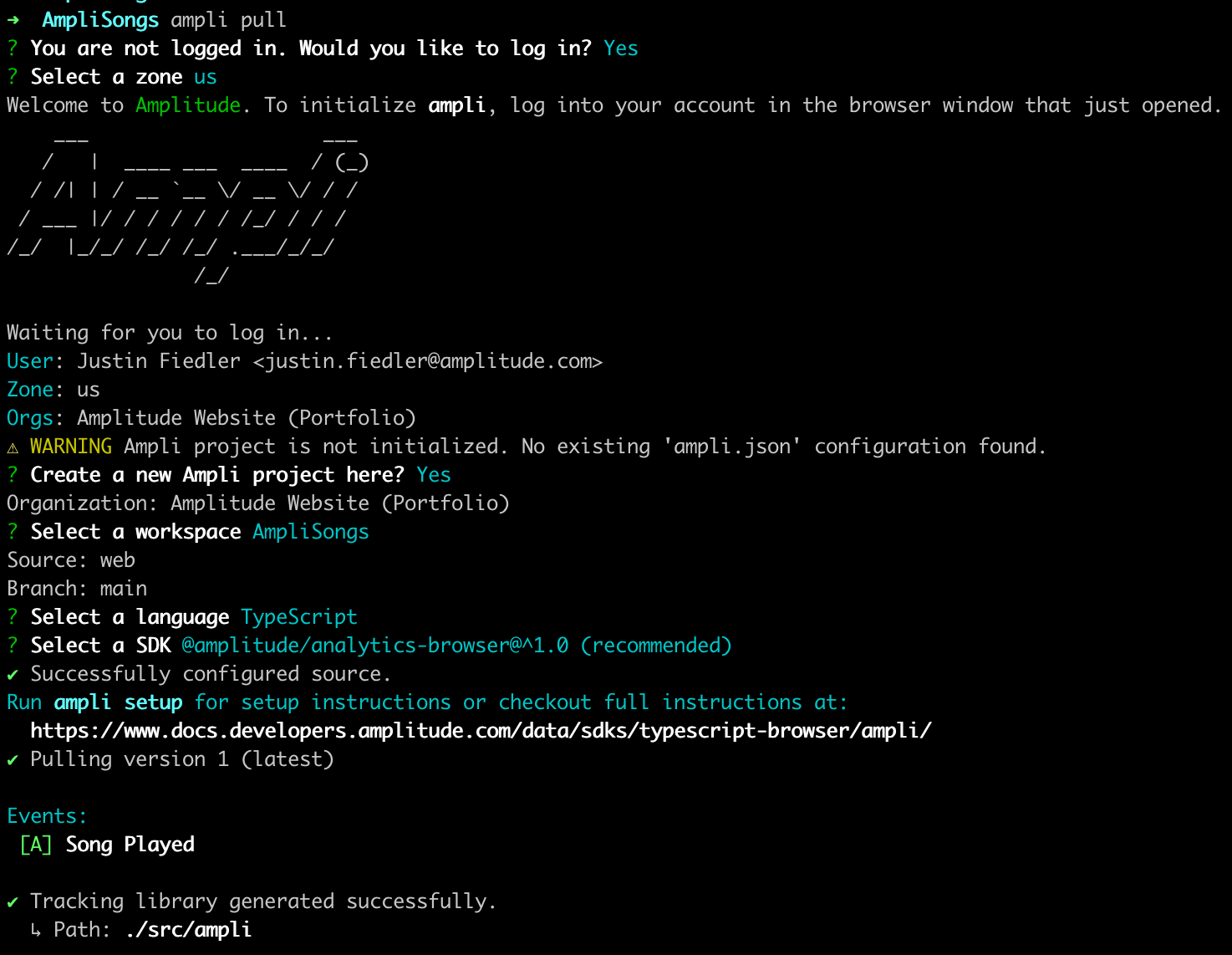Ampli
Overview¶
Ampli dynamically generates a light-weight wrapper for the Amplitude SDK based on your analytics tracking plan in Amplitude Data making event tracking easier and less error-prone.
This document provides a high-level overview of Ampli. A video demo is also available below and in Amplitude Academy.
The Ampli Wrapper provides types and methods that prevent human error by strictly enforcing event names and property values. The wrapper code enables autocompletion for all events and properties in your tracking plan, as well as static type checks at development and compile time.
import { ampli, SongPlayed } from './ampli';
// These 2 events are tracked as expected.
ampli.songPlayed({ title: 'Happy Birthday' });
ampli.track(new SongPlayed({ title: 'Song 2' }));
// The following 2 events won't track due to data quality issues.
// Instead they generate type errors at build time with information
// about the expected property names and types.
// Error: Event 'Song Played' is missing required property 'title'
ampli.songPlayed({ name: 'I Knew You Were Trouble' });
// Error: Property 'title' received 'boolean' expected type 'String'
ampli.songPlayed({ title: true });
Compare this to the general purpose Amplitude SDK. Sending events with hand entered values can create data quality issues and require close coordination between data governors and engineers.
import * as amplitude from '@amplitude/analytics-browser';
// These 2 events are tracked as expected
amplitude.track('Song Played', { title: 'Happy Birthday'});
amplitude.track({
event_type: 'Song Played',
event_properties: {title: 'Song 2'}
});
// The following 2 events are tracked but have data quality issues making them
// difficult to include in analysis. Typos and type errors are easy to create
// and hard to find & fix.
// Charts based on 'title' will not include this event, which sets 'name' instead.
amplitude.track('Song Played', { name: 'I Knew You Were Trouble' });
// This event will not be included in charts based on event_type='Song Played'.
// Also it sets 'title' to boolean 'true' instead of the expected type 'String'.
amplitude.track('sonG Playd', { title: true });
The Ampli CLI generates the Ampli Wrapper and can verify the instrumentation status of your events. This makes it easy to know if you missed any event tracking calls giving you confidence that you successfully completed your implementation.
➜ ampli status
✔ Verifying event tracking implementation in source code
✔ Song Played (1 location)
✔ All events tracked: 1 found, 1 total
Supported Platforms¶
Ampli supports the following platforms - Browser, Android, iOS, React Native, Node, Go, Python, and Java. The other Amplitude SDKs for Flutter, Unity, and Unreal do not have Ampli at this time.
Ampli Supported Platforms and SDKs
Platform |
Ampli Support |
Supported Amplitude SDK(s) |
|---|---|---|
| Browser | Yes | @amplitude/analytics-browserAmpli documentation amplitude-jsAmpli documentation |
| Android | Yes | com.amplitude:analytics-androidAmpli documentation com.amplitude:android-sdkAmpli documentation |
| iOS | Yes | AmplitudeAmpli documentation |
| React Native | Yes | @amplitude/analytics-react-nativeAmpli documentation @amplitude/react-nativeAmpli documentation |
| Node | Yes | @amplitude/analytics-nodeAmpli documentation @amplitude/nodeAmpli documentation |
| Go | Yes | github.com/amplitude/analytics-goAmpli documentation |
| Python | Yes | amplitude-analyticsAmpli documentation |
| Java | Yes | com.amplitude:java-sdkAmpli documentation |
| Flutter | No | |
| Unity | No | |
| Unreal | No |
Amplitude Data¶
Create a tracking plan for your events¶
Amplitude Data allows you to plan your analytics by defining the events and properties you want to track in your application. Ampli requires a tracking plan in Amplitude Data with events added to an SDK source.
The following examples will reference this tracking plan.
- Browser SDK source named
web - Event
Song Playedwith required propertytitleof typeString - Event
Song Playedis added to sourceweb - Environment named
production
 |
 |
 |
|---|---|---|
| Create a Source for your desired platform | Create Events in your tracking plan and assign them to your Source | View Source settings and instructions |
Ampli CLI¶
The Ampli CLI connects to Amplitude Data and uses the schema information for a given Source to generate and verify the Ampli Wrapper in your project.
Install the Ampli CLI¶
You can install the Ampli CLI from Homebrew or NPM.
brew tap amplitude/ampli
brew install ampli
npm install -g @amplitude/ampli
Generate the Ampli Wrapper with ampli pull¶
Running ampli pull connects to Amplitude Data and downloads the Ampli Wrapper for your tracking plan.
ampli pull [source-name] [--path ./path/for/generated/ampli/wrapper]
The Ampli Wrapper is associated to a specific Source in Amplitude Data. You can optionally provide the desired Source name as a parameter, if not you will be prompted to select one.
? Select a Source: web
The first time you run ampli pull on a source you will be asked to select a development language and an underlying Amplitude SDK. If you want to change the Source configuration later you can run ampli configure to select a different platform, language, or Amplitude SDK.
? Select a platform: Browser
? Select a language: TypeScript
? Select a SDK: @amplitude/analytics-browser@^1.0 (recommended)
The generated Ampli Wrapper will then be available in the provided path. If no path was provided, the Ampli CLI provides a sensible default based on the platform of your Source.
✔ Tracking library generated successfully.
↳ Path: ./ampli
Verify event instrumentation with ampli status¶
Running ampli status scans the source code in your project directory and checks for event tracking calls e.g. ampli.songPlayed({ ... }). It will output the number of times each event is detected.
➜ ampli status
✔ Verifying event tracking implementation in source code
✔ Song Played (1 location)
✔ All events tracked: 1 found, 1 total
If there are events in your tracking plan that are not implemented ampli status will return an error. For example, if you were to add a new event Song Favorited to the tracking plan but not instrument it in the project.
➜ ampli status
✔ Verifying event tracking implementation in source code
✔ Song Played (1 location)
✘ Song Favorited
✘ ERROR Event tracking incomplete: 1 missed, 2 total
Ampli Wrapper¶
A generated SDK for your tracking plan¶
The Ampli Wrapper is a thin facade over the Amplitude SDK that provides convenience methods e.g. ampli.songPlayed() and classes e.g. new SongPlayed() for all events in your tracking plan.
import { ampli, SongPlayed } from './ampli';
ampli.load({ client: { apiKey: AMPLITUDE_API_KEY } });
ampli.client.setUserId('ampli@amplitude.com');
ampli.songPlayed({ title: 'Happy Birthday' });
ampli.track(new SongPlayed({ title: 'Song 2'}));
ampli.flush();
Wrapping the Amplitude SDK¶
The Ampli Wrapper provides access to all methods of the underlying Amplitude SDK instance via ampli.client. It is possible to configure the instance directly or provide an existing one. If none is provided a default instance of the Amplitude SDK is used.
import * as amplitude from '@amplitude/analytics-browser';
import { ampli } from './ampli';
import { CustomPlugin } from './plugins';
// Initialize the Amplitude SDK instance
amplitude.init(AMPLITUDE_API_KEY);
// Provide the Amplitude SDK instance to Ampli
ampli.load({ client: { instance: amplitude }});
assertEqual(ampli.client, amplitude);
// Call methods directly on the Amplitude SDK
ampli.client.add(CustomPlugin);
ampli.client.setUserId('ampli@amplitude.com');
ampli.client.setGroup('team', 'awesome');
To configure the underlying Amplitude SDK instance without creating it directly provide client.configuration to ampli.load(). All configuration options of the underlying Amplitude SDK are supported.
ampli.load({ client: { apiKey: AMPLITUDE_API_KEY, configuration: { serverZone: 'EU' } }});
Add the Ampli Wrapper to your project and track events¶
Use the Ampli CLI to download the Ampli Wrapper.
ampli pull [--path ./ampli]
The downloaded source code in path and ampli.json should be added to your repository and source control.
git add ./ampli ampli.json
git commit -m "Added Ampli wrapper"
Depending on the Amplitude SDK selected for your Source your will need to install the corresponding dependency.
npm install @amplitude/analytics-browser
Once the Ampli Wrapper has been downloaded with ampli pull and dependencies installed you can start using it to track events in your code.
import { ampli, SongPlayed } from './ampli';
ampli.load({ client: { apiKey: AMPLITUDE_API_KEY } });
ampli.songPlayed({ title: 'Happy Birthday' });
ampli.flush();
Use the Ampli CLI to verify instrumentation status of the Ampli Wrapper in your project.
ampli status
Video Tutorial¶
Migrating from the Amplitude SDK¶
It is easy to start using Ampli with your existing implementation. Learn more about migrating to Ampli from the Amplitude SDK.



